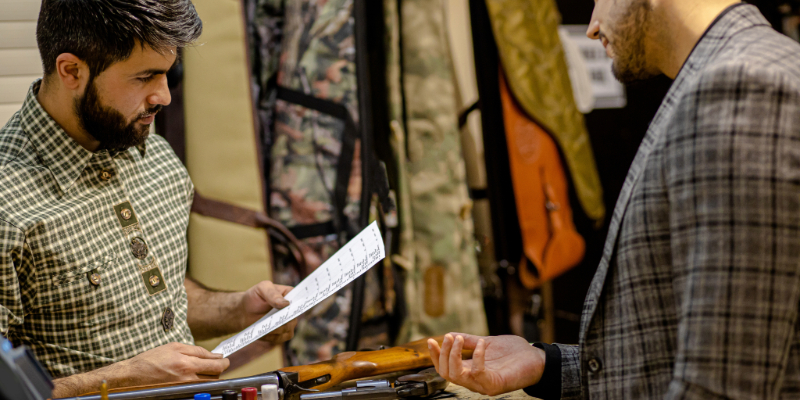Can a Convicted Felon Restore Their Gun Rights in Arizona?

Losing the ability to own a firearm is one of the most serious and lasting consequences of a felony conviction in Arizona. The law considers anyone convicted of a felony to be a prohibited possessor who may not legally own, purchase, or carry a gun. For many, this restriction feels like a lifelong penalty that continues long after they have served their sentence, completed probation, and reintegrated into society.
But Arizona law does provide a pathway for certain individuals to seek restoration of firearm rights. Whether you are eligible depends on the type of conviction, whether it was considered a serious offense as defined under Arizona Revised Statutes (ARS), whether you’ve completed all restitution, and how long it has been since your release or absolute discharge from imprisonment.
This article discusses the following:
- Felony Convictions and Firearm Prohibitions in Arizona
- Civil Rights Restoration vs. Gun Rights Restoration
- Automatic Restoration of Civil Rights Under ARS
- Petitioning the Court for Gun Rights Restoration
- Serious and Dangerous Offenses That Cannot Be Restored
- Step-by-Step Process for Restoration of Firearm Rights
- Real-World Examples of Restoration Cases in Arizona
- Common Barriers to Rights Restoration
- Defense Strategies to Strengthen Your Application
- FAQs About Felony Gun Rights in Arizona
- Important Things to Remember
- How Kolsrud Law Offices Can Help
In this article, we’ll break down the laws surrounding gun rights restoration in Arizona, the difference between civil rights restoration and firearm rights restoration, and the step-by-step process for filing an application for restoration. We’ll also explain how an experienced attorney like Josh Kolsrud can help prepare and argue your petition in superior court.
Felony Convictions and Firearm Prohibitions in Arizona
When a person is convicted of a felony in Arizona, the law under ARS 13-3101(A)(7) automatically classifies them as a prohibited possessor. This means their right to possess a firearm is lost or suspended as a result of the conviction.
Key takeaways:
- Anyone convicted of a felony in another state is treated the same way in Arizona if the offense committed outside the jurisdiction of this state would be considered a felony here.
- The restriction applies until a restoration of firearm rights pursuant to this section has been granted.
- Federal law (18 U.S.C. § 922(g)(1)) also prohibits felons from owning guns, so even if state rights are restored, federal barriers may remain if the conviction is recognized under federal law.
The Department of Public Safety and the Arizona Department of Corrections both play roles in verifying whether a person’s firearm rights have been restored. In some cases, the state or the federal bureau of prisons may also have records that impact eligibility.

Civil Rights Restoration vs. Gun Rights Restoration
It’s important to understand the difference between restoration of civil rights and restoration of firearm rights.
- Civil rights restoration includes the right to vote, sit on a jury, and hold public office.
- Gun rights restoration is separate and must be specifically requested.
Even first-time felony offenders whose civil rights are automatically restored under ARS 13-910 do not automatically regain the ability to possess or carry a firearm.
This means:
- Your voting rights may be automatically restored once you’ve completed probation or the receipt of an absolute discharge from prison.
But your restoration of the right to possess or carry a firearm requires filing an application to restore with the court.
Automatic Restoration of Civil Rights Under ARS
Under A.R.S. 13-907, a person who has completed their sentence for a first-time felony may be entitled to the restoration of civil rights automatically.
This automatic process applies when:
- The person was convicted of a non-serious, non-dangerous felony.
- They have received an absolute discharge from the Department of Corrections or completed probation.
- They have paid all victim restitution that was imposed as part of the sentence.
However, firearm rights restoration is not included in this automatic restoration of civil rights. To restore gun rights, one must file an application under ARS 13-908 or ARS 13-910.
Contact us today to schedule a
FREE CONSULTATION and learn
how we can help you.
Petitioning the Court for Gun Rights Restoration
Arizona law requires most individuals to petition the court for the restoration of firearm rights.
- Under ARS 13-908, a person may apply to the superior court in the county where they were convicted.
- They must show proof of absolute discharge from imprisonment or discharge from probation and evidence that they have paid all restitution and completed all obligations.
- The court may then grant or deny the petition based on the seriousness of the offense, time elapsed, and the applicant’s criminal record since release.
If the person who has previously been convicted of multiple felonies applies, the law requires a waiting period of at least two years from the date of their discharge.
Serious and Dangerous Offenses That Cannot Be Restored
Certain convictions make a person permanently ineligible for firearm rights restoration.
- A serious offense as defined under ARS 13-706 includes murder, sexual assault, armed robbery, kidnapping, and aggravated assault causing serious injury.
- A dangerous offense under ARS 13-704 or ARS 13-105(13) includes crimes where a weapon was used or serious injury was inflicted.
If a person is not entitled because they were convicted of a serious offense, then the court has no authority to restore their gun rights.
Step-by-Step Process for Restoration of Firearm Rights
Here is the typical process for seeking firearm rights restoration in Arizona:
- Completion of probation or receipt of an absolute discharge from prison.
- Paying all restitution and fines, including any victim restitution that was imposed.
- Waiting the required time:
- First-time felony offenders may file immediately after completing terms.
- Others must wait 10 years from the date of your absolute discharge if the offense was serious but not classified as dangerous.
- File the application or petition the court in the county where the conviction occurred.
- The court may grant or deny the petition after reviewing your rehabilitation, community involvement, and lack of further convictions.
Real-World Examples of Restoration Cases in Arizona
Example 1: Felony Conviction in Another State
A man served time in a prison in another state and later moved to Arizona. Because the offense committed outside the jurisdiction of this state was not considered serious or dangerous under Arizona law, he was able to apply for restoration of civil rights and later sought firearm rights restoration through the superior court.
Example 2: Victim Restitution Unpaid
A woman applied for restoration after a drug conviction but still had unpaid restitution. The judge ruled that a person is not entitled until they have paid all restitution in full.
Common Barriers to Rights Restoration
Even if eligible, individuals face challenges:
- Unpaid victim restitution or fines.
- Having a criminal record since release.
- Being convicted of misdemeanor domestic violence, which triggers federal restrictions.
- Convictions suspended as a result of a felony conviction that the state or the federal bureau considers permanent.
- Opposition by the prosecutor, who may argue the person who has previously been convicted poses a public risk.
Defense Strategies to Strengthen Your Application
Here are several strategies to increase the likelihood of success in firearm rights restoration cases:
- Proving rehabilitation with letters from employers, evidence of treatment, and community service records.
- Clarifying eligibility when the conviction if the person served time in another state or the federal system.
- Challenging classification if an offense as defined in section 13-706 or 13-704 is wrongly applied.
- Emphasizing compliance by showing the person has received an absolute discharge and paid all victim restitution.
Framing proportionality to argue that permanent loss of the right to possess or carry a firearm is excessive for a non-violent crime.
FAQs About Felony Gun Rights in Arizona
Can someone whose civil rights have been automatically restored still need to petition for gun rights?
Yes. Even if your civil rights restored automatically, you must apply for restoration of firearm rights separately.
What if my conviction was committed in this state but I served in the federal bureau of prisons?
You may still apply to the superior court once you’ve received an absolute discharge and paid all restitution.
What is the difference between ARS 13-907 and ARS 13-908?
13-907 deals with automatic restoration of civil rights after discharge. 13-908 allows you to file an application for restoration of firearm rights.
What if my conviction was suspended as a result of probation?
You must show proof of completion of probation and that you have paid all victim restitution.
How long is the waiting period?
For most, there is no mandatory wait beyond discharge. However, those with multiple felonies or serious convictions must wait 10 years from the date of your absolute discharge.
Important Things to Remember
How Kolsrud Law Offices Can Help
An award-winning criminal defense attorney Since 2006
Why Choose Josh Kolsrud
With over 100 trials to his name, and years of experience as a state and federal prosecutor, Josh understands the law, the legal process, and your rights. Josh is also committed to representing every client with utmost integrity and dedication
Experience
Josh has prosecuted major crimes on the state and federal level, led a successful anti-human sex trafficking operation that saved lives, and argued before countless juries and justices for his clients
Expertise
Josh is an expert in both Arizona and federal criminal law, and is ready to put that expertise to work for you.
Dedication
As a prosecutor, Josh saw far too many defendants lose their livelihood due to poor representation. Josh will always give every client his complete attention and effort
Get a Free Initial Consultation:
Complete our form below to get a free case review.
or call us at (480) 999-9444.
